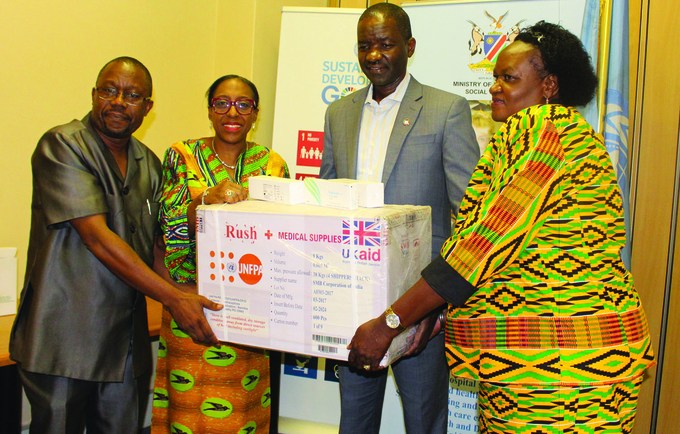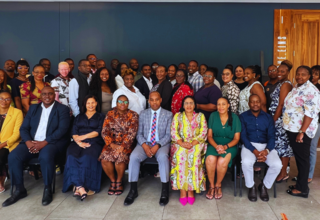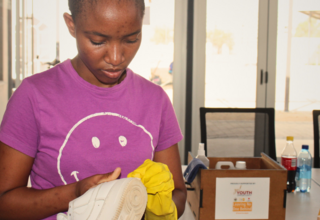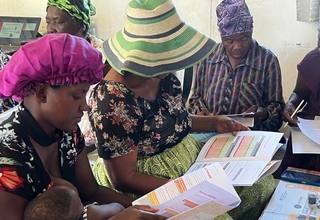Windhoek, Namibia – The United Nations Population Fund (UNFPA) Namibia Country Office on 8 February 2018 handed over reproductive health commodities worth N$7 million to the Ministry of Health and Social Services.
The donation, made possible through Preventing Maternal Deaths in East and Southern Africa (PreMDESA) project, included DMPA Depo-Provera and soloshots syringes (60,000 units), Noristerate and soloshots syringes (110,000 units), Copper T IUDs (5000 units), female condoms (200,000 units) and Implanon NTX (7000 units).
With this donation, more than 70 000 beneficiaries are expected to gain from access to modern contraceptives, averting over 22 000 unintended pregnancies, 4 000 unsafe abortions and 40 maternal deaths. This includes adolescent girls and young women to prevent early pregnancies.
Although Namibia has made tremendous progress in reproductive health efforts over the past 27 years, there are still barriers impeding the use of modern contraceptives. Unmet need for contraception remains high (12 per cent ) among women in Namibia, while 19 per cent of adolescent girls (15-19 years old) have begun childbearing, with some regions reporting proportions of more than 36 per cent indicating that more vigorous efforts are needed to understand and to meet the needs of adolescents and young people.
Addressing the gathering, the Honourable Minister of Health and Social Services Dr. Bernhard Haufiku stressed the need for the country to tighten its comprehensive sexuality education to equip Namibians with the knowledge on sexual and reproductive health issues as he feels the bulk of the people are ignorant and lack knowledge hence the high incidents of teenage pregnancies.
“It is a meaningful contribution to our arsenal in combating teenage pregnancies, especially at a time when we are facing economic hardships. We all know the statistics; this is the time to empower our youth, to empower them with skills and knowledge. I know in some areas in the country there is a certain level of ignorance where teachers do not mention sex at all. It is time we changed that culture. We must teach our youth that it is better to have a child when you are ready, when you can clothe, feed and provide the child with a roof over his/her head. We need progressive young people to develop our country,” Haufiku stated.
UNFPA Country Representative Ms. Dennia Gayle reiterated UNFPA’s commitment to supporting the country to ensure that contraceptives are available and accessible to all women and girls who wish to avoid or delay pregnancy.
“UNFPA is a strong believer that when we invest in adolescents and young people sexual and reproductive health including ensuring access to contraceptives it is the smartest investment Namibia can make. We need our young people to stay in school, build their skills and competencies and prepare them for a labour market that is vibrant and efficient,” she said.
UNFPA partners with governments, program donors and non-governmental organisations that benefit from the volume pricing and quality assurance that come with products procured from UNFPA suppliers. UNFPA Country office and Government of Namibia are finding synergy with the Procurement Services Branch (PSB) as it offers services that ensure best value for money, fairness, integrity and transparency based on partnership experiences and Long Terms Agreements (LTAS) with vendors from all over the world.
The UNFPA Product Catalogue contains a variety of quality-assured contraceptives, medical equipment and devices, pharmaceuticals, and kits related to reproductive health as well as census supplies and humanitarian supplies for use in crisis situations. The Catalogue is online at UNFPA Procurement Services https://www.unfpaprocurement.org/and it is updated regularly, providing the most recent product information and current pricing. The UNFPA Procurement Services website features easy to navigate menus, and interactive tools including the Lead-time Calculator, Budget Planner Tool, and the Product Catalogue.




